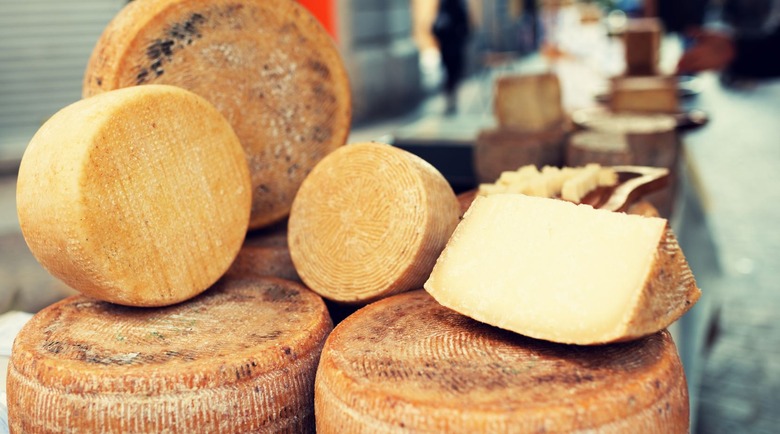Your Favorite Cheese Might Be Made With Stuff From A Calf's Stomach
In order to make cheese, the milk needs to be coagulated into curds, which are then strained, shaped, pressed, and aged. In order for coagulation to happen, something needs to be added to it, and it's oftentimes an enzyme called rennet. We're sorry if you're squeamish, because in some cases that enzyme is extracted from the fourth stomach chamber, called the abomasum, of a calf, lamb, or goat.
The key component of rennet is a protease enzyme called chymosin, which helps the young animal digest its mother's milk by curdling the protein (casein) in it. It can be extracted in a couple different ways. The traditional method requires drying and cleaning the stomach before slicing it into small pieces and allowing it to soak in a solution of salt water and vinegar before being filtered. The modern method requires deep-freezing the stomach, grinding it up, soaking it in an enzyme-extracting solution, and filtering the resulting product several times. In both cases, the end result is a clear liquid, and a very small amount is all that's required to coagulate a large batch of milk.
Most of the world's best cheeses are made using animal rennet, including artisanally-made Parmigiano-Reggiano, Cheddar, mozzarella, and Brie; mass-produced factory cheeses like Velveeta, Kraft Singles, and Easy Cheese use other processes. And soft cheeses, like ricotta, chèvre, mascarpone, and Indian paneer are coagulated without rennet, by acid, heat, or a culture.
More and more cheesemakers are starting to use vegetarian rennet these days, so if you're totally put off by animal-derived rennet (or if you're a vegetarian), you can seek those out; many cheeses (especially the less-expensive ones) are made with vegetable-based rennet, microbial rennet, or high-tech fermentation-produced chymosin (FPC), which contain no animal product whatsoever. In fact, up to 80 percent of all cheeses on Earth are made using FPC. Junket rennet tablets, which you might have spotted in the supermarket, are also vegetarian, but are best used for making custard and ice cream.
Even though the majority of the cheeses that you'll find in your supermarket don't contain animal-derived rennet, most of the ones at your favorite cheese shop do. You can always stop buying those cheeses if you're completely grossed out, but first keep a couple things in mind: Cheese is one of the most delicious things on earth, and the fact that it's basically fermented and aged milk means that it's already a little funky to begin with!
